 |
| Some Asanzo TVs are still on display at a Dien may Cho Lon store - PHOTO: TNO |
Multiple electronics retailers such as Dien may Cho Lon, Dien may Xanh and Nguyen Kim in HCMC have removed some of the Asanzo product lines from their shelves since yesterday morning, June 23.
Staff members of a Nguyen Kim electronics supermarket on Cach Mang Thang Tam Street in Tan Binh District told Thanh Nien newspaper that nearly 20 Asanzo TVs of various sizes had been repacked and returned to their manufacturer. Other Asanzo home appliances, including cookers, ovens and electric kettles, had been removed from shelves as well.
Asanzo products encountered the same fate at a facility owned by Dien may Cho Lon. Many Asanzo TVs, the best-selling item, and home appliances were taken off shelves due to the origin fraud allegation against the brand. However, a modest number of 32- to 43-inch TVs were still on display at large discounts, according to sales staff.
Located near the facility of Dien may Cho Lon, a store owned by Dien may Xanh had all its Asanzo products removed too. Consumers were still visiting a zone displaying Asanzo portable speakers at the store though.
Besides this, Tran Nguyen Tuan Anh from Thien Hoa electronic supermarket chain told Tuoi Tre that Thien Hoa had suspended sales of Asanzo products at all its facilities following a probe by Tuoi Tre into the origin fraud allegation. Thien Hoa also asked Asanzo distributors to give a full explanation for its product origins in line with prevailing regulations.
Aside from these major retailers, several ecommerce platforms that had previously sold Asanzo items had to temporarily put these products under “Out of stock” or “Add to wait list” status, while awaiting an official response on the origin fraud claim.
Meanwhile, Asanzo TVs and air conditioners are being traded normally on certain ecommerce sites such as Shopee.vn, Lotte.vn and Lazada. A representative of Shopee was quoted by Tuoi Tre newspaper as saying that the ecommerce operator was working with the competent agencies to take further steps in trading Asanzo products.
Earlier, after collecting evidence on Asanzo Vietnam’s import, assembly and distribution activities, Tuoi Tre wrote to the competent agencies, aiming to verify whether the electronic maker runs lawful operations.
On May 22, the HCMC Department of Customs, in response to Tuoi Tre, said that there was no evidence proving that the registered business locations of firms that import Chinese products for Asanzo were fake.
As for tax obligations, the customs department, in collaboration with the municipal Taxation Department, has directed the competent authorities to inspect these importers’ practices in terms of tax payments.
The customs department also put these importers under supervision.
Established in 2013, Asanzo Vietnam has launched multiple mobile phones and home appliances such as air conditioners, microwaves, cookers and blenders, with TVs being its key product line. The company is preparing to roll out a line of vacuum cleaners as well. The electronics manufacturer targetted to generate revenue of VND10 trillion this year.
Origin fraud causes disorder in domestic market
Consumers are shocked after learning that several electronic products of Asanzo Group were made in China but had been disguised as Vietnamese-made products for years and even were honored as Vietnamese high quality goods. After the truth about Asanzo’s products was exposed, the High Quality Vietnamese Product Business Association said that it has taken away the power to use the certificate of Vietnamese high-quality goods of this company.
In the announcement released on June 21 relating to the fact that Asanzo Group has been selling several household appliances labelled ‘made-in-Vietnam’ but actually originated from China and were recognized as Vietnamese high quality goods, Mrs. Vu Kim Hanh, chairwoman of the High Quality Vietnamese Product Business Association, apologized consumers and other true enterprises for this mistake.
The act of importing Chinese products then labelling as Vietnamese ones has seriously hurt the confidence of Vietnamese consumers in Vietnamese products and caused bad impact on the prestige of the high-quality Vietnamese product program.
Many products of Asanzo were displayed at various electronic supermarkets and electronic stores across the country. However, after the origin of Asanzo’s products was uncovered, its products have been no longer displayed or sold at those places. Many electronics centers including Nguyen Kim and Dien May Xanh announced that products of Asanzo were ‘out-of-stock’ or ‘no longer sold’.
However, at the present, not only have products of Asanzo been cheating Vietnamese consumers but there are also lots of products labelled as ‘made-in-Vietnam’ products but actually were made in China at low cost price with poor quality. These products, then, were slipped into Vietnamese market to evade import tax and trick consumers.
For years, many Vietnamese products have enjoyed the advantage when consumers return to support high-quality Vietnamese goods and boycott cheap, low quality goods smuggled from China.
The campaign to encourage Vietnamese people to prioritize using Vietnamese goods is not only an appeal but many products made by Vietnamese firms have won the confidence of consumers.
However, the situation that many products labelled ‘made-in-Vietnam’ but actually made in China then slipped into Vietnam’s market via illegal and even official import.
Lung Vai market in China is considered as a ‘general depot’ of cheap and low quality consumer goods that usually supplies goods for some Vietnamese firms. The market has hundreds of shops and kiosks located next to each other. Every kiosk is filled with goods at surprisingly low prices. According to a shop owner, he can supply as many batches of clothes as ordered. If customers want clothing labels of Thai, Korean or Vietnamese brands, whatever brands, they just need to deposit 50 percent of total value of the consignment.
Another shop owner said that customers do not have to worry about transport. Clothes will be packed and delivered to Vietnam by a transport team. The shipping cost is calculated by weight. The consignment will be delivered in Lang Son Province or in Hanoi as requested.
What caught our attention is that they can make ‘made-in-Vietnam’ labels in China then attach them on cheap and low quality products manufactured in China which then are transported to Vietnam to sell.
The owner of a firm in Hanoi revealed that at the present, many firms hire Chinese companies to process and print labels and tags to provide their customers because the cost of processing in China is half of that in Vietnam.
In addition, Chinese companies already have technology and machinery so the quality of counterfeit labels and tags is not different from the authentic ones. There are firms even hiring factories in China to mainly process their products to reduce cost prices.
Currently, industrial products and building materials also experienced the same situation of being labelled as ‘made-in-Vietnam’ but actually originating from China.
Mr. Tran Huu Linh, head of the Market Surveillance Agency under the Ministry of Industry and Trade, said that fake labelling is currently from two sources: firms order Chinese factories to manufacture products for them then smuggle into domestic market via trails and firms make fake products domestically.
As for counterfeit products that are made and sold in domestic market, Mr. Linh said that the agency has been intensifying inspection but it requires close cooperation of the firm whose products are being counterfeited. He cited that market surveillance officers lately seized more than 3,000 counterfeit watches of various famous brands and the case was uncovered because these foreign watchmakers reported to market surveillance authority. Other cases were disclosed thanks to collaboration of firms.
As for the situation that products are counterfeited in foreign countries, Mr. Linh said that the agency usually cooperates with relevant authorities, such as border guard and customs which are the main forces in anti-smuggling and anti-counterfeiting at border gates.
‘When fake, smuggled and low quality products enter domestic market, market surveillance authority will increase inspection and punishment. However, market surveillance department is only one of the units which deal with origin fraud,’ said Mr. Linh.
According to Mr. Tran Thanh Hai, deputy head of the Agency of Foreign Trade under the Ministry of Industry and Trade, origin fraud is not only for reducing cost prices and increasing profits but also for receiving preferential tax when exporting to other countries. The ministry has ordered Vietnamese export firms to follow regulations about origin certificate and not to abet origin fraud act.
Recently, several steel products of Vietnam were involved in misfortune because of Chinese steel products as the EU decided to launch safeguards investigation against Vietnamese steel products on suspicion that they originate from China. Meanwhile, the US used to imposed extremely high anti-dumping tax rate on Vietnamese steel products. SGT/SGGP

Asanzo discovered selling Chinese products bearing made-in-Vietnam labels
Electronic products from Asanzo Vietnam, known as an electronics manufacturer supplying high-quality Vietnamese products in the local market, have been discovered to be Chinese goods being sold as Vietnamese products.
 Several major retailers of mobile phones and home appliances have taken Asanzo-branded items off their supermarket shelves, after Asanzo Vietnam was discovered trading Chinese electronic products bearing Made-in-Vietnam labels.
Several major retailers of mobile phones and home appliances have taken Asanzo-branded items off their supermarket shelves, after Asanzo Vietnam was discovered trading Chinese electronic products bearing Made-in-Vietnam labels.